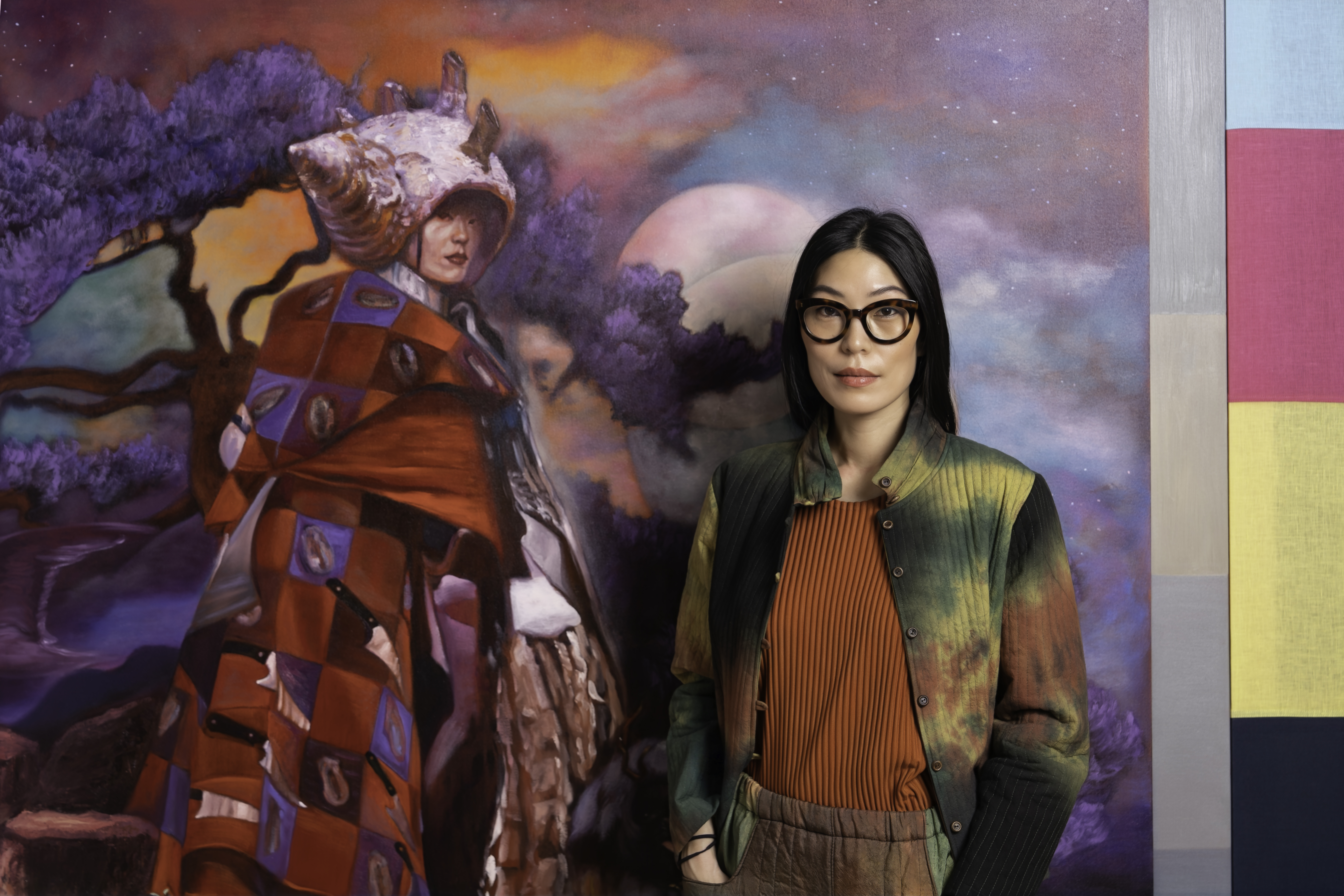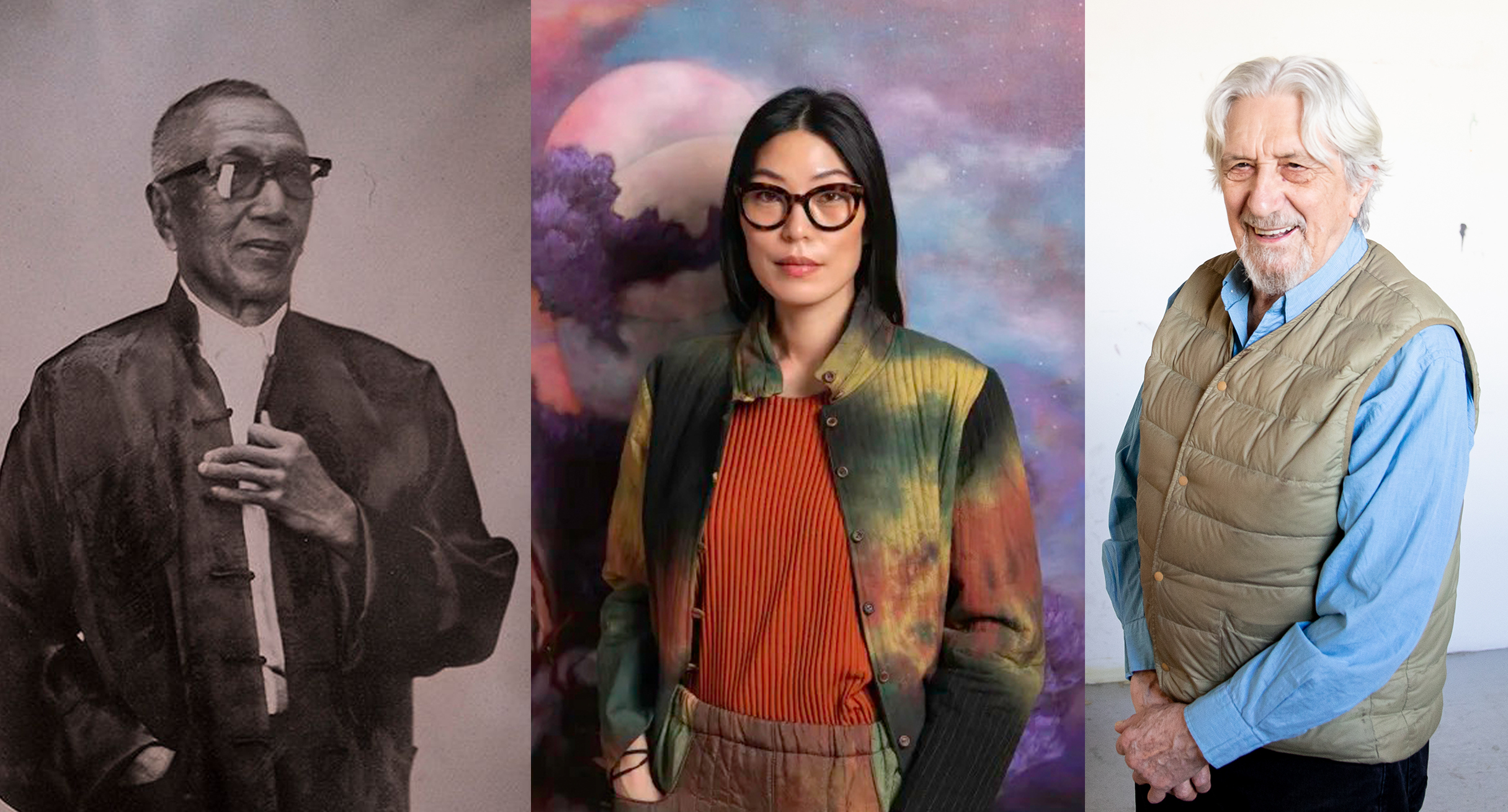Zadie Xa Wants You to Believe in the Power of Community

Zadie Xa. (Photo by Artifacts / courtesy Thaddaeus Ropac Gallery)
Posted on
The interdisciplinary artist and 2023 Emily Award recipient worked hard and worked collaboratively to earn her growing reputation, and she wants to show you how you can do it too.
Zadie Xa (BFA 2007) wants you to know a few things.
An art career can’t be built in isolation. Success doesn’t happen overnight. And you can build the career you want, because you are the real power behind the art world.
On the heels of a series of high-profile exhibitions, including a recent solo showing titled House Gods, Animal Guides and Five Ways 2 Forgiveness at London’s Whitechapel Gallery, the interdisciplinary artist and 2023 Emily Award recipient says this message amounts to a crucial caveat to her growing reputation.
“Visibility doesn’t pay the bills,” she tells me via Zoom from her studio in London. Artists are often pressured to work for inadequate pay to serve “great publicity” or an attention economy, she continues. And visibility is important, but not if it’s coupled with economic insecurity.
“There is a lot of emphasis on who is seen or publicly appearing to be successful,” she says. “And sometimes people think, ‘Once I reach this milestone in my career, I’ll be in a good place.’ But it doesn’t work like that. In reality, lots of artists are financially struggling to keep it all afloat. I guess that’s why, for me, it’s really about relationship building.”
Zadie is the generative force behind her complex, multipart artworks. But she is quick to credit the many other artists without whose contributions she says her career could not exist.
This is especially true with regard to her longtime collaborator Benito Mayor Vallejo, an artist she met at Emily Carr University and with whom she has shared title credit on lauded works including 2021’s Scorpion. But it’s also true with regard to curators, members of technical teams or the artists who perform in her works. Failing to acknowledge their input — creative or otherwise — is not only a kind of lie, it’s morally and ethically wrong.

From Scorpion, 2021. Oct 29, 2021. By Zadie Xa and Benito Mayor Vallejo. Curated by Priyesh Mistry. The National Gallery, London UK. Supported by Canada Council for the Arts. (Photo by Andrew Bruce / courtesy Zadie Xa)
The emphasis on individual genius in the arts is neither realistic nor factual, she said during an interview on The Art Newspaper’s A Brush With… podcast. No one lives in a bubble. Even when an artist works alone in a studio, teams of people are involved in platforming their work. Glossing over this support is both conspicuous and dishonest, she says.
Centering it openly and transparently is a foundational principle behind working in community, she adds. This principle leads to mutual advocacy and more durable peer networks. It also advances equity in the arts.
Zadie came from a single-parent household where money was tight. This meant she had fewer advantages than some of her peers during and after art school.
“Working in community is really important,” she tells me. “I wouldn’t be in the position I am in right now had it not been for people holding the door open for me and saying my name in rooms where people who have agency to provide platforms were.”
In light of sweeping cultural changes in the wake of the pandemic, economic uncertainty and an international focus on social justice driven by the Minneapolis Uprising, Zadie says working in community is increasingly urgent.
“I think that particularly across class and race lines, it’s really, really important,” she says. This is especially true given the uneven power dynamics between artists and institutions.
“Time and time again, you see institutions failing communities, particularly those whose labour is predicated on everyone else having a job from the top down. We can only push against that by working together.”

Installation image of House Gods, Animal Guides and Five Ways 2 Forgiveness, 2022. Whitechapel Gallery. Exhibition conceived and produced in collaboration with Benito Mayor Vallejo. Sound work made with Tom Slater. (Photo by Andy Keate / courtesy Zadie Xa)
But working in community also means actively working against one’s own ego. For instance, traditions of “information hoarding” are very much alive amongst artists, she continues. This spirit of individual competitiveness undermines both the artist and their community. It leaves younger artists vulnerable to exploitation and robs everyone of opportunities for mutual benefit.
Zadie suggests this notion is neither radical nor a mystery.
“I think the only way you can have a long career is if you vouch for other people and put yourself on the line for them,” she says. “And you will have that in return, right? It’s just life stuff.”
Achieving visibility can also mask the long road that led to it. Zadie says she sometimes felt frustrated with how slow her career seemed to build following graduation. Although she obtained her BFA 15 years ago, Zadie only established what she considers her first “real” relationship with a gallery this year, she notes.
But this interlude gave her space to think deeply about how she wanted her career to look. And in retrospect, that feels like a blessing.
“People need to figure out what they want from an art career because so many different art careers can happen. You can shape it how you want,” she says. “But if your goal is to be a practicing artist, the goal is to be that until you die. Hopefully, that’s a long arc. So, people shouldn’t feel anxious and impatient. Because that’s definitely how I felt when I was younger. And those are things we don’t have to feel.”
Quality exhibition opportunities will come, she says. But you must stay dedicated to your practice and participate in your community.
“Having a steadfast, rigorous studio practice, going to the studio whenever you can, is the most important thing,” she says. “And working hard at supporting one another, where people advocate for each other. And then things do happen.”

Installation of Long ago when tigers smoked, 2022, The Box Plymouth, UK. (Photo by Dom Moore / courtesy Zadie Xa)
Zadie likewise recalls feeling anxious to leave Vancouver after graduation. The city felt insular, she says, and she doubted whether she’d find opportunities for artistic growth. But looking back, she realizes her time there continues to play a central role in how she approaches art.
“I learned a lot when I was at Emily Carr,” she says. “I feel like it’s the foundation of the artist I am today.”
She also believes that ECU graduates should feel assured that their ability, education and insight will stand them toe-to-toe with any other practitioner from any other place.
“People should feel proud with all the knowledge they’ve accumulated the past four years,” she says. “They have something special and unique to offer on a global stage. We are definitely able to play ball on an international field in a way that I maybe didn’t realize when I was younger.”
Most importantly, artists need to remember that there is no art world without them.
“It’s essential to take the time to think about what kinds of projects we want to do. We need to think about what we’re getting out of things,” she says. “Because ultimately, artists should understand that we have agency. We have a kind of cultural soft power — which is the actual power. Without the work that artists do, none of these places would exist.”
Visit Zadie’s website to learn more about her work.
--
Visit ECU online to learn more about studying Visual Arts at Emily Carr.
